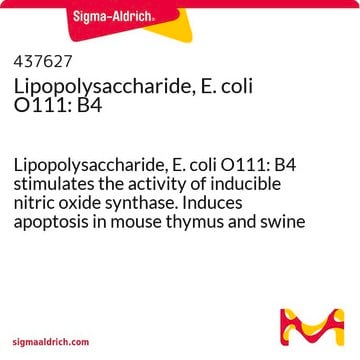507862
PANSORBIN® Cells, Lyophilized
Iniciar sesiónpara Ver la Fijación de precios por contrato y de la organización
About This Item
UNSPSC Code:
41116133
NACRES:
NA.41
Productos recomendados
form
lyophilized
Quality Level
manufacturer/tradename
Calbiochem®
storage condition
OK to freeze
shipped in
ambient
storage temp.
2-8°C
General description
Formalin-fixed and heat-killed Staphylococcus aureus cells bearing protein A that bind to the Fc portion of human IgG subclasses 1, 2, and 4, and to IgG from other species (binding capacity: ≥2 mg human IgG/100 mg cells). Used for many purposes, including radioimmunoassays, enzyme immunoassays, agglutination, and immunoprecipitation of antigens. PANSORBIN also stimulates B-lymphocyte production and inhibits neoplasm growth. Lyophilized from preparations of Cat. No. 507858. Note: size of 5 g or 1 g refers to the wet cell weight.
Lyophilized from preparations of Cat. No. 507858. Note: size of 5 g or 1 g refers to the wet cell weight.
Packaging
Packaged under inert gas
Warning
Toxicity: Standard Handling (A)
Physical form
Lyophilized from PBS, 0.1% NaN₃.
Reconstitution
Following reconstitution, aliquot and refrigerate (4°C). Stock solutions are stable for up to 1 month at 4°C.
Reconstitute in sterile distilled H₂O.
Reconstitution with 10 ml sterile dH₂O yields a 10% (w/v) cell suspension.
Other Notes
Kierszenbaum, F., et al. 1991. Immunology74, 317.
Meikle, P.J., et al. 1991. J. Biol. Chem.266, 22569.
Ezaki, O., et al. 1989. Biochem. Biophys. Res. Commun.159, 1368.
Murakami, H., et al. 1988. Biochem. J.256, 917.
Kessler, S.W. 1975. J. Immunol.115, 1617.
Meikle, P.J., et al. 1991. J. Biol. Chem.266, 22569.
Ezaki, O., et al. 1989. Biochem. Biophys. Res. Commun.159, 1368.
Murakami, H., et al. 1988. Biochem. J.256, 917.
Kessler, S.W. 1975. J. Immunol.115, 1617.
Legal Information
CALBIOCHEM is a registered trademark of Merck KGaA, Darmstadt, Germany
PANSORBIN is a registered trademark of Merck KGaA, Darmstadt, Germany
signalword
Danger
hcodes
Hazard Classifications
Acute Tox. 3 Oral - Aquatic Chronic 3
Storage Class
6.1C - Combustible acute toxic Cat.3 / toxic compounds or compounds which causing chronic effects
wgk_germany
WGK 3
Certificados de análisis (COA)
Busque Certificados de análisis (COA) introduciendo el número de lote del producto. Los números de lote se encuentran en la etiqueta del producto después de las palabras «Lot» o «Batch»
¿Ya tiene este producto?
Encuentre la documentación para los productos que ha comprado recientemente en la Biblioteca de documentos.
Eriko Kudo et al.
International journal of molecular medicine, 41(4), 2366-2374 (2018-01-18)
Copper metabolism Murr1 domain containing 1 (COMMD1) has multiple functions in the regulation of protein stability at the plasma membrane and in the cytoplasm. However, the regulation of COMMD1 transcriptional has remained to be elucidated. In the present study, the 5'‑flanking
Ambica Bhandari et al.
Methods in molecular biology (Clifton, N.J.), 763, 51-71 (2011-08-30)
The mammalian epidermis is a self-renewing stratified squamous epithelium. Its basal cell layer contains proliferating keratinocytes that exit the cell cycle when they move into the suprabasal compartment. These cells activate a gene differentiation program aimed at building a protective
Deborah L Burkhart et al.
PLoS genetics, 6(6), e1001003-e1001003 (2010-06-30)
The retinoblastoma tumor suppressor (Rb) is a potent and ubiquitously expressed cell cycle regulator, but patients with a germline Rb mutation develop a very specific tumor spectrum. This surprising observation raises the possibility that mechanisms that compensate for loss of
Jillian M Couto et al.
American journal of medical genetics. Part B, Neuropsychiatric genetics : the official publication of the International Society of Psychiatric Genetics, 153B(2), 447-462 (2009-07-10)
Reading disabilities (RDs) have been associated with chromosome 6p with recent studies pointing to two genes, DCDC2 and KIAA0319. In this study, markers across the 6p region were tested for association with RD. Our strongest findings were for association with
Natalia Varlakhanova et al.
Molecular and cellular endocrinology, 332(1-2), 180-188 (2010-10-23)
The SMRT (Silencing Mediator of Retinoid and Thyroid hormone receptors) corepressor mediates gene repression by nuclear receptors and other transcriptional factors. The SMRT protein serves as a key nucleating core that organizes the assembly of a larger corepressor complex. We
Nuestro equipo de científicos tiene experiencia en todas las áreas de investigación: Ciencias de la vida, Ciencia de los materiales, Síntesis química, Cromatografía, Analítica y muchas otras.
Póngase en contacto con el Servicio técnico






